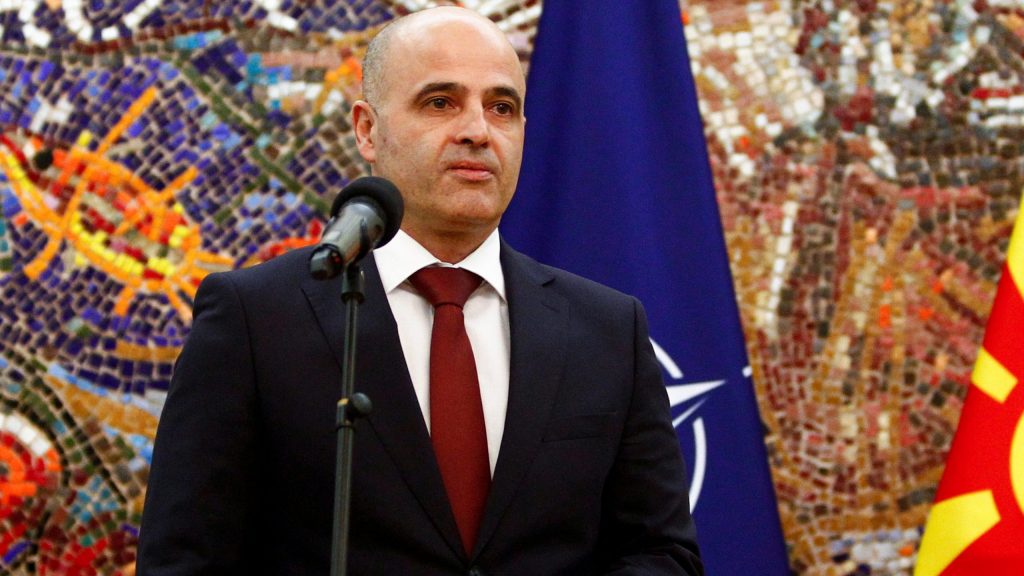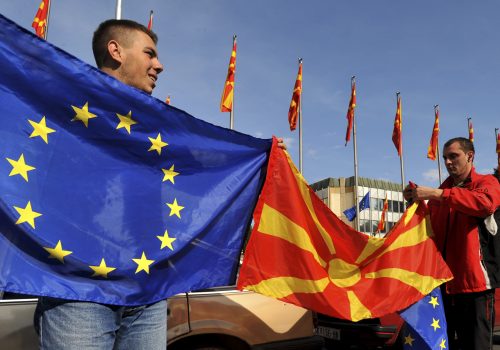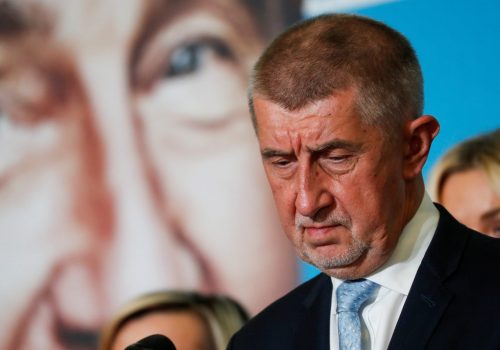Locked in an arcane dispute over shared history and language—but with real political consequences—Bulgaria and North Macedonia may finally be on their way to a thaw in relations. On January 18, a high-level delegation led by newly inaugurated Bulgarian Prime Minister Kiril Petkov travelled to Skopje and was welcomed by his North Macedonian counterpart, Dimitar Kovachevski, who had assumed office the day before.
Bulgaria has been holding up the launch of North Macedonia’s accession process to the European Union (EU) for the better part of two years, and this stalling has played a crucial role in both the recent cabinet reshuffle in Skopje and the resignation of Kovachevski’s predecessor, Zoran Zaev. For its part, Bulgaria has also struggled to put up a government, with its citizens asked to vote a remarkable three times in 2021 to find a coalition that could hold together.
With a new government finally in place, Petkov’s visit was eagerly anticipated—and the trip yielded some encouraging results.
The two leaders announced the start of regular commercial flights between Sofia and Skopje, while a joint session of their respective cabinets is scheduled to take place in Bulgaria on January 25 (the first time since November 2017). These initiatives reflect Petkov’s desire to focus ties with North Macedonia on matters such as the economy and infrastructure and away from history. The Bulgarian side, meanwhile, announced it would officially start using “North Macedonia,” the country’s short name, as opposed to “the Republic of North Macedonia,” which ruffled diplomatic feathers because of its implied territorial claims vis-à-vis a part of southwest Bulgaria (known as Pirin Macedonia). To dispel such fears, Skopje said it would send an official note to the United Nations to underscore it holds no irredentist designs.
But is a genuine breakthrough really at hand? While the momentum may eventually lead to Bulgaria lifting its veto on North Macedonia’s accession talks with the EU, there are multiple obstacles and spoilers ahead.
Playing politics
Petkov himself is no fan of holding relations with North Macedonia hostage to a clashing interpretation of history. The two countries argue about the national identity of Slavs in Macedonia: whether they were (in the not-so-distant past) Bulgarians or constituted a distinct ethnicity with a language of their own. But he faces formidable opposition at home: A week before his visit to Skopje, the Consultative Council on National Security, an advisory body convened by President Rumen Radev, confirmed the hardline position adopted back in October 2019. And although it wasn’t made explicit in the Council’s declaration, there was support for forcing North Macedonia to amend its constitution to include an explicit reference to a Bulgarian community living within its borders. The declaration was non-binding, but the message was clear: Petkov was told in no uncertain terms that he shouldn’t rush into greenlighting its neighbor’s EU talks.
The Security Council meeting also highlighted tensions within Bulgaria’s governing coalition. Petkov’s We Continue the Change party views Bulgaria’s veto as a nuisance and a potential irritant for its relations with other European countries. So does its partner, Democratic Bulgaria, a liberal center-right coalition which typically appeals to middle-class, pro-Western urbanites. But the other two parties in Petkov’s coalition—the populist There is Such a People and the Bulgarian Socialist Party—aren’t interested in accommodation. They may not exit the coalition over North Macedonia, but they will likely be fighting tooth-and-nail against any softening of current policy. President Radev, who was instrumental in launching Petkov’s political career, is on their side too.
Even within his own borders, the newly minted prime minister has a steep hill to climb.
The past is never past
Looking ahead, one can imagine either an optimistic or a pessimistic scenario playing out.
Optimistically, Petkov and Kovachevski will ramp up government-to-government cooperation—notably through the working groups proposed by the Bulgarian side and agreed to in Skopje—focusing on issues such as trade, investment, transport, and cross-border infrastructure. The fresh momentum will create cover for Petkov to argue at home for lifting the veto on EU accession. It’s worth remembering that Bulgaria endorsed the start of membership talks in March 2020; what it subsequently blocked was the adoption of the negotiation framework—the EU Council’s marching orders to the European Commission. That’s why Petkov legitimately has some room to maneuver.
To get Bulgaria to “yes,” North Macedonia would probably need to make some further symbolic concessions, including resuming joint celebrations of historic events such as the 1903 Ilinden Uprising (central to national mythologies in both countries) or restarting a stalled commission on resolving some of the most intractable historical disputes. Zaev, Kovachevski’s predecessor, seemed ready to make many of these moves and simply lacked a partner in Sofia. For his part, Petkov would need to win over more than 80 percent of Bulgarians who believe that the Macedonian side is acting in bad faith. Thankfully, the issue isn’t a top day-to-day concern for Bulgarian voters. Petkov will need to rely on his ample political salesmanship skills, as he did in the electoral campaign and in his business career. He may choose to argue that North Macedonia could be blocked on its EU path further down the road, after accession talks begin in earnest, should Sofia assess its neighbor is not honoring its prior commitments.
It’s important to remember that even under the best of circumstances, the historical dispute is unlikely to ever be fully resolved. A single version of history remains firmly out of reach, and instead, two national narratives will need to co-exist in tension. It’s the job of responsible leaders to make sure such clashing interpretations don’t get out of hand (as they have recently). That shouldn’t be too hard to pull off: On the individual level, there is little animosity in either direction, and people on both sides of the border easily intermingle—whether in marriage, business, trade, or investment. There are also many families with members living in both countries (including my own). In these ways, the Bulgarian-Macedonian squabble differs markedly from the stereotype of a bloody-minded Balkan conflict.
Still, the intractability of this dispute shouldn’t be underestimated, and more pessimistic scenarios remain quite plausible. For example, after some initial success in reinvigorating ties with Skopje, Petkov may face strong pushback within his coalition, as well as from Radev. Demands that North Macedonia amend its constitution may get louder. For his part, Kovachevski—mindful of his predecessor’s failed attempts to sway Sofia with concessions and unreciprocated gestures—might well decide the risk is not worth it. The opposition center-right VMRO-DPMNE and the leftist-populist Levica will no doubt make his life difficult, too, as will some of his comrades in the governing Social Democratic Union of Macedonia.
With no partner in Skopje and mounting opposition at home, Petkov may abandon his charm offensive, since he has plenty of more pressing priorities at home. Bulgaria is facing a lost decade in terms of institutional reform, especially concerning the rule of law: Overhauling the all-powerful Office of the Prosecutor General—accused of political meddling and turning a blind eye to large-scale embezzlement—is a particularly pressing priority. It was the opposition to state capture that brought Bulgarians to the streets in 2020 and what eventually propelled Petkov and his coalition to power. Domestic challenges certainly weigh more heavily on his mind than solving an unpleasant row with his neighbor. In other words, a lasting impasse is easy to imagine.
So what can third parties do in this situation? Not much—beyond facilitating dialogue and helping those in Skopje and Sofia seek compromise. There is a fallacy in North Macedonia that intervention by Germany, the United States, or another international heavyweight could make Bulgaria change its mind. That’s not going to happen. Right now, North Macedonia’s best bet is Petkov, and Skopje’s friends in the West would do well to help him succeed in his efforts. The odds are not great, but they’re far from hopeless.
Dimitar Bechev is a nonresident senior fellow with the Atlantic Council’s Europe Center.
Further reading
Wed, Dec 9, 2020
North Macedonia on the threshold of Europe
Report By Damir Marusic, Dimitar Bechev
This report outlines the myriad challenges that face North Macedonia as it struggles to chart a path forward on EU accession and calls for Western leaders—especially those in Europe—to consider how they can be more productively and strategically engaged.
Wed, Jun 30, 2021
How Aleksandar Vučić stole the vaccine-diplomacy show
New Atlanticist By Dimitar Bechev
By balancing the West, Russia, and China, Serbian authorities have made impressive headway in inoculating their citizens—and using vaccines as a diplomatic tool.
Thu, Oct 14, 2021
Is liberalism ending its losing streak in Central Europe?
New Atlanticist By Petr Tůma
The Czech opposition's victory could inspire other democratic forces across the region.
Image: Prime Minister Dimitar Kovacevski of North Macedonia addresses the press after receiving the mandate to form a coalition government in Skopje on December 29, 2021. Photo by Ognen Teofilovski/REUTERS



